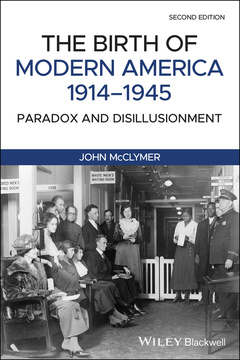Description
The Birth of Modern America, 1914 - 1945 (2nd Ed.)
Paradox and Disillusionment
Author: McClymer John
Language: English
Subject for The Birth of Modern America, 1914 - 1945:
304 p. · 15x22.6 cm · Paperback
Description
/li>Contents
/li>Biography
/li>
Provides a look at the origins of the culture wars of modern America and the political and economic transformation of the U.S. republic
This book tells, in clear and lively prose, how Americans struggled with modernity in both its cultural and economic forms between the start of World War I and the end of World War II, focusing on the 1920s through 1930s. This edition includes revisions that expand the scope and features increased coverage of topics that will be of great interest to new readers as well as those familiar with the subject.
The Birth of Modern America, 1914-1945, Second Edition begins with a discussion of the promises and perils of the progressive era. The book goes on to look at the Great War and life on the home front and explores many paradoxes that marked the birth of Modern America. Topics covered include: the pervasive racism and nativism during and after WWI; the disillusionment with Woodrow Wilson's rhetorical idealism; the emergence of national media; the Great Depression; FDR and the New Deal; the attack on Pearl Harbor; Hollywood?s part during World War II; the United States' decision to drop "the bomb" on Japan; and more.
- Makes a strong contribution to understanding American society in the interwar years (1920s and 1930s)
- Disputes that American entry into WWII brought the New Deal to an end and argues that wartime measures foreshadowed postwar American practice
- Features more coverage of politics in the 1920s and 1930s
- Includes an Afterword covering the G.I. bill, postwar prosperity, Americans' move to the suburbs, the challenges to peace in Europe and Asia, and the Cold War
The Birth of Modern America, 1914-1945 is an excellent book for undergraduate courses on the 20th Century and advanced placement courses. It will benefit all students and scholars of the Progressive Era, the Depression, 1920s and 1930s America, and America between the Wars.
About the Author
Introduction
Acknowledgement
Chapter One: The Second Ku Klux Klan
Chapter Two: The Declension of Evangelical Protestantism: The Scopes Trial, Fundamentalism, and Pentecostalism
Chapter Three: What Sadie Knew: The Immigrant Working Girl and the Rise of a Demotic Culture
Chapter Four: The “Seven Lively Arts” Revisited: The Demotic Impulse in Popular Culture
Chapter Five: Passing From Light Into Dark
Chapter Six: Revues and Other Vanities: The Commodification of Fantasy in the 1920s
Chapter Seven: The Great Depression and the New Deal
Chapter Eight: WWII
Epilogue
John McClymer, PhD, is a retired Professor of History at Assumption College (now Assumption University). He is the author of seven books, including The AHA Guide to Teaching and Learning with New Media and Mississippi Freedom Summer. He served as an editor for online projects for The Journal of the Gilded Age and Progressive Era, as a co-editor of H-ETHNIC, and as a member of H-NET’s Teaching Committee. Professor McClymer is the recipient of numerous fellowships and grants, including an NEH Curriculum Development grant and two Teaching American History grants in partnership with Worcester Public Schools, the American Antiquarian Society, and Old Sturbridge Village.




